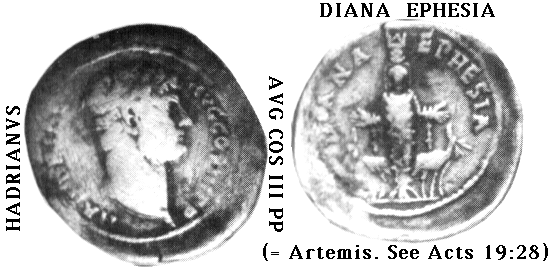 A coin featuring Diana, the god of Ephesus.
A coin featuring Diana, the god of Ephesus.READ Revelation 2:1-7. Ephesus
John has been told by Jesus to write letters to the seven (= all) churches. Compared to the rest of Revelation, chapters 2 and 3 are written in relatively plain language. Though John wants the Roman censors to think that he has gone mad or senile, he must make sure that the Christians do not get the same idea. He is therefore careful in his words here to show that he is still in his right mind and understands what is happening in each of the congregations named. Every letter of chapters 2 and 3 opens with "I know ..." John knows these churches that he once served, but Jesus who speaks these words knows more.
In Biblical times most cities and villages (83% of those named in the Book of Acts) minted their own coins at some time period. The seven mentioned in Revelation did so as well. To help emphasize that these were real churches and real people in these cities, I have included a picture of a coin from each of the seven cities.
You have been introduced to the idea of coded language in the last lessons. See how much code-breaking you can do on your own in this lesson.
 A coin featuring Diana, the god of Ephesus.
A coin featuring Diana, the god of Ephesus.
READ Revelation 2:1-7. Ephesus
Ephesus is the capital of the Roman province of Asia, and John had made his home there before his arrest. The people there will know that the letter is genuine and will read it carefully and pass it on. Look back at 1:12-20 which you read in the last lesson.
Who "holds the seven stars" and "walks among the seven golden lampstands"?
What (or who) are the seven stars? (remember or look at your answer before)
What are the seven lampstands?
Who therefore is the "I" of verses 2-7?
The "wicked men" who are "false apostles" are those who teach heresy, things that are not Christian, and try to draw the people away from following Christ and what Jesus taught.
What did the church members of Ephesus do to these "false apostles" (verse 2)?
What are they praised for in verse 3?
What is wrong with them (verse 4)?
This refers to their original love and zeal for Jesus. It is a common tendency for Christians to slowly loose their love and zeal for Jesus. That is why today's churches seem so lifeless and why they seem to have none of the power that one reads about in Acts. One of the terms we sometimes use for this is "backsliding". One of my own backsliding periods was in the late 1960's. Even though I always went to church, taught Sunday school, worked with the youth group, served on the church council, tithed, and visited Israel and mission fields around the world in 1970, my faith was fading from a peak in 1964-65. It was becoming all outward works and a hollow, empty inside. I couldn't even rejoice when an African evangelist told me about his work in saving souls in Arusha, Tanzania. Perhaps it has happened to you as well. Maybe it is in your future.
What is the solution for "backsliding" (verse 5)?
What will happen to the church in Ephesus if they fail to do this? (verse 5; remember the meaning of "lampstand"!)
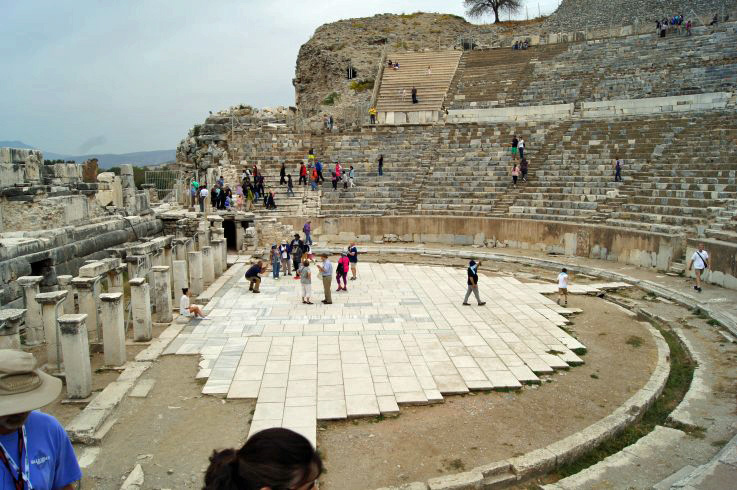 The theater of Ephesus in which there was a riot mentioned in Acts 19.
The theater of Ephesus in which there was a riot mentioned in Acts 19.
Ephesus was conquered by the Goths in 262 A.D., declined, and was deserted by the tenth century. Only ruins are there today in a country that is overwhelmingly Islamic in faith. The works and teachings of the Nicolaitans have mostly faded from modern memory. It was most likely a Gnostic cult that watered down Christianity with pagan and secular ideas and practices to justify their joining in the lusts and evils of the world around them. There philosophy may have been, "Well, everybody is doing it", therefore they might as well do it also. The practice is common today as well and severely harms our churches. More about this later in the lesson.
What are you being tempted or asked to do or believe because "everybody is doing it"?
The "tree of life" is described in Genesis 2:9 and 3:22,24. Look them up.
What is the value of this tree of life?
Back in Revelation 2:7, the word "overcomes" or "conquers" is a variation of the Greek word NIKE meaning "victory". It appears to mean remaining faithful to Jesus in spite of the persecutions. Therefore, what is the meaning of verse 7?
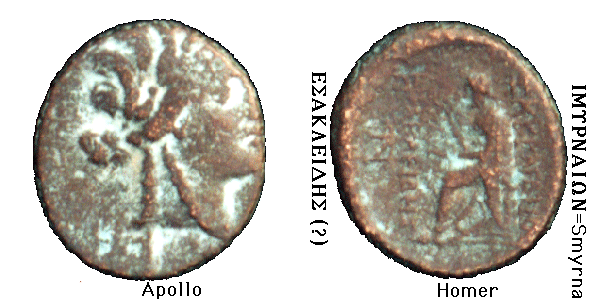 a coin from Smyrna
a coin from Smyrna
READ Revelation 2:8-11. Smyrna
Who is "the First and the Last, who died and came to life again" (verse 8)?
The city of Smyrna (now Izmir) is large today and prosperous. Jesus knows the poverty and wealth of the Christians at Smyrna (verse 9).
How are they poor? ___money, ___faith.
How are they rich? ___money, ___faith.
Jesus knows the verbal abuse they are suffering from those who claim to know God but don't. Remember that 10 is a code word for "many", but not huge; therefore the period is limited.
What are the Smyrna Christians about to experience (verse 10)?
The second death (verse 11 and at the end of Revelation) is the judgment of the wicked that occurs after everyone (good and bad) is resurrected. The Christians are not judged but go directly to heaven. The "crown of life" means a joyous eternal life that begins on earth and lasts forever in heaven.
What are the promises to the faithful in verses 10, 11?
"Be faithful, even to the point of death" suggests that many Christians will be killed by the persecutions. The most famous one was Polycarp, their bishop who was killed in 155 A.D. They are not to worry; they have their reward in heaven.
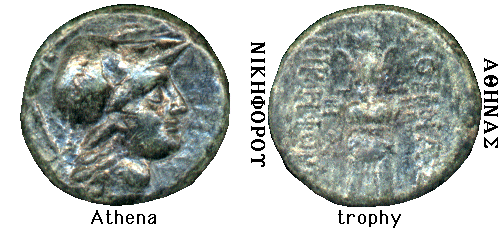 a coin from Pergamum
a coin from Pergamum
READ Revelation 2:12-17. Pergamum
Who "has the sharp, double-edged sword" (verse 12)?
What is the sword? (If you forgot, try Hebrews 4:12)
"Satan has his throne" in numerous places around town where the Roman emperor (Domitian) was worshipped as a god and where there was the temple of one of the many idols. Today there is a small city there by the name Bergama.
What are the Christians of Pergamum praised for (verse 13)?
When the Israelites were about to enter the Promised Land, Balak, the king of Moab, hired the prophet Balaam to curse the Israelites. The long story, including the talking donkey, is in Numbers 22-24. But God made Balaam bless them instead. Then Balak let his people invite the Israelites to sacrifice to their idols and to eat in the religious feasts and thus worship false gods and not the true God. They also invited the Israelites to engage in sexual immorality with their women. (Numbers 25) So the bad teaching of Revelation 2:14 might be, "Let's do as everyone else is doing, just for the fun of it." This is essentially the same as the teachings of the Nicolaitans (literally, "people conquerors") in verse 15.
What, therefore are the Christians at Pergamum criticized for (verses 14,15)?
What must they do instead (verse 16)?
What will happen if they do not?
Tolerance and compromise with those who do not keep Christian doctrine pure or who are adulterous and otherwise sinful is not permitted by Jesus! Jesus wars against such defiled people with the Truth in the Scriptures. Perhaps our church needs a similar cleansing.
In verse 17 the hidden manna refers to the food in heaven. The white stone (like a medal or trophy or plaque) may symbolize a special entry into an exalted status. The new name may signify the Christian's spiritual rebirth when he is born again into the kingdom of God. Verse 17 therefore promises a new life, a more important life, a life in heaven, for all who overcome (= remain faithful to Jesus).
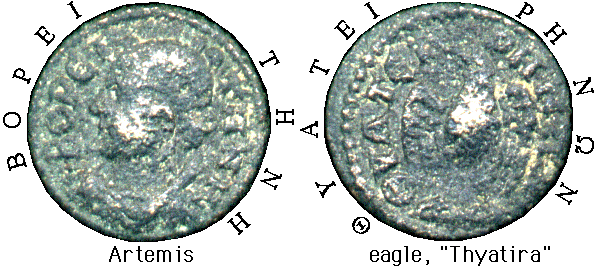 a coin from Thyatira
a coin from Thyatira
READ Revelation 2:18-29. Thyatira
The small city of Thyatira still exists today. Lydia, the first believer in Philippi (Acts 16), was from there.
Who is glowing like a "blazing fire" (verse 18)?
Verse 20 has the content the same as verse 14. Therefore, it refers to the same bad practices. Jezebel was the wife of Ahab, king of the Northern Kingdom at the time of the prophet Elijah. She introduced the worship of Baal (which involved sexual immorality) and tried to kill everyone faithful to God. She is considered the most wicked woman of the Old Testament. She died by being thrown over a wall, trampled by horses, and eaten by dogs until only her skull, hands, and feet were left to be buried. (1 Kings 16 to 2 Kings 10) Her name is used here symbolically for the leader of the Nicolaitans.
Today the idols we are asked to worship include money, fame, ourselves, pleasure, sex, sports, drugs, education, job, government, a life of ease, people, and other things. We are asked to make these most important in our lives, even more important than God. Most people, including church members, go along with these ideas. Immorality here means not only having sexual relations with a person who is not your husband or wife; it is also a code word (used often by the Old Testament prophets) for worshipping anyone or anything who is not God. By going along with these teachings we become "children" of "Jezebel". We learn the "deep secrets" of Satan.
What, therefore, is the meaning of verses 20-23?
Who will do the punishing (verses 22,23)?
What are the faithful Christians to do in the meantime (verse 25)?
"What you have" is the true faith in Christ. The iron scepter symbolizes justice. It will shatter inferior pots made of clay but cannot break metal pots, only reshape them. The morning star is the brightest "star" in the sky. Scientifically it refers to the planet Venus, but here it is a code word for power and majesty and for the person who holds them.
Who is the morning star (Rev. 22:16)?
What, therefore, do the faithful get for holding out to the end for God and for doing his works (Rev. 2:26, 28)?
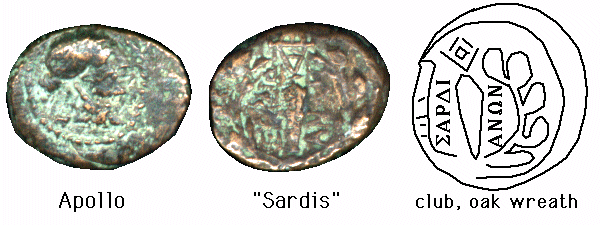 a coin from Sardis
a coin from Sardis
READ Revelation 3:1-6. Sardis
Who has the "seven spirits" and the "seven stars"?
Sardis was the location of the richest king in the world (Croesus) when coins were invented. The people trusted in their wealth, walls, and armed forces, but were conquered in 540 B.C. and 218 B.C. before the Romans took over. Then an earthquake destroyed the city in 17 A.D. but Tiberius rebuilt it. Today only the small settlement of Sart is there. Perhaps the city was repeatedly lethargic and careless about their security, never preparing for destruction and death.
The church in Sardis looks like it is in bad shape!
Have you ever seen or been in a "dead" church that people still come to (verse 1)?
What is such a church told to do (verse 2)?
In the last lesson you were asked to quote Matthew 5:48 (You must be perfect, as your Father in Heaven is perfect.) But our sinfulness makes us imperfect as soon as we are born. Only those who become part of the Body of Christ and who function in the Body are seen as perfect and alive by God. Clean, white garments are the code symbol for this perfection.
In the Jerusalem Bible translation, verse 3 begins, "and yet do you remember how eager you were when you first heard the message? Hold on to that. Repent."
What happens to those who do not repent?
Are there any true Christians in Sardis (verse 4)?
What is the reward and meaning of verse 5?
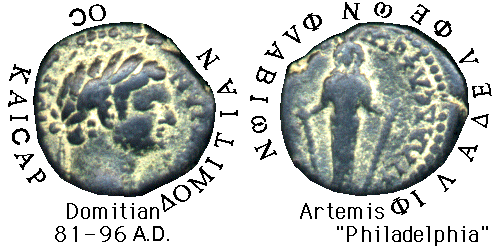 a coin from Philadelphia
a coin from Philadelphia
READ Revelation 3:7-13. Philadelphia
Who "holds the key" that is the final verdict (verse 7, also 1:18)?
Philadelphia was founded about 150 B.C. and still exists today, with about 10 percent Christians in this Islamic country. The "open door" is an opportunity to expand God's kingdom. This congregation is not criticized, and they will be spared from the severe persecution (verse 10). They have little power on their own.
READ 2 Corinthians 12:9,10.
Whose power is allowed to operate when we have weaknesses?
The miraculous help is easier for us to see when it is obvious that we cannot do something on our own.
What have the Christians in Philadelphia done (Rev. 3:8)?
Who will be taught by Jesus (verse 9)?
What will they be taught (end of verse 9)?
What are the Christians to do (verse 11)?
A "pillar" in God's temple in heaven will be there forever. The Christians who remain faithful will be "branded" with God's identifications and will be God's people forever. (verse 12)
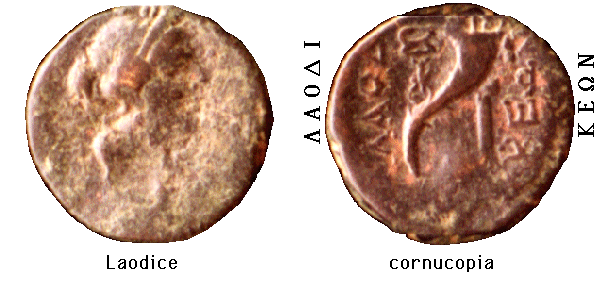 a coin from Laodicea
a coin from Laodicea
READ Revelation 3:14-22. Laodicea
The city of Laodicea was enlarged about 250 B.C. and named after the wife, Laodice, of king Antiochus II. It is now replaced by the district city of Denizli. It was mentioned by Paul in the letter to the Colossians, a nearby city. There are no good words for the church in this chapter. Yet this church is most like today's churches in this country. We are in danger of God's judgment ourselves! Let's look at it carefully.
Who is "the Amen, the faithful and true witness, the ruler of God's creation"? (verse 5 and John 1:1-3, 14)
Laodicea was built along a stream. Upstream were some hot springs, useful as a tourist resort. Downstream were abundant fish where the water became cold. At Laodicea the water was lukewarm, worthless for tourists and in which no fish would live. They had banking and clothing industries and a medical practice specializing in an eye ointment. Notice how John mentions these things as he writes the condemnation from Jesus. All of these become spiritual symbols. "Lukewarm" Christians don't care. They will come to church sometimes, put something in the offering plate sometimes, maybe even work on some committee. But they wouldn't want to be caught giving Jesus more than a couple of hours or dollars per week. They may resemble backslidden Christians but have never really discovered Jesus personally. They are in spiritual poverty, blind to what Jesus offers them, and their pitiable condition is obvious through their spiritual nakedness. They are also immune to God's help. If we are eagerly for God, we please him and are useful to him. If we are really against God, then God can send a miracle like he did for Paul (= Saul) or through our running away from God we discover him. But God cannot or will not work with people who do not take sides; they are spewn from his mouth.
What is your present spiritual temperature? ___Hot (= for God), ___Lukewarm (= indifferent to God), ___Cold (= against God)
How is the church in Laodicea rich (verse 17)? ___money, ___faith.
How is it poor? ___money, ___faith.
How are we to become rich in the eyes of Jesus? (verse 18, and also Matthew 6:19-21)
How are we to get the "white clothes" symbolizing perfection? (verse 18, also Rev. 7:14 if you can break the code, also 3:5 as discussed above)
How are we, who are spiritually blind, to see? (verse 18, also John 9:39 and Luke 18:41,42)
What is the meaning of verse 19? (See Hebrews 12:5-11 for help)
COPY Revelation 3:20 here:
Who is knocking?
The door is the "door" to our hearts and those of others who claim to be Christians.
How do we "open the door? (see also John 14:22-24 for ideas)
Jesus promises to come into the lives of everyone who lets him in. He comes in to be a guest and a friend as well as to guide our lives. This is his promise, and Jesus does not lie.
Have you opened your "door" to Jesus yet?
Where is the throne on which the "overcomers" will sit (verse 21)?
We have now seen what the churches were like. They were probably complaining to God, "Why are you letting us suffer this persecution? Look at all we have done for you and for your kingdom! Look at our faith! There are probably no better congregations than we are. You, God, are being unfair to us by letting us suffer!" But God sees things differently. There are imperfections everywhere. God loves his churches. He will therefore make them more perfect. He will purify his church through the persecutions so that they can become strong. God sends a "refiner's fire" that burns away the trash and leaves a "pure gold". He does this even today. He calls us to repentance, to become something better. We can therefore thank God for the troubles we are having, because through them God is strengthening us and making us more perfect in his eyes.
Back, Next
Background,
Introduction, Lesson
1,
2,
3,
4,
5,
6,
7,
8,
9,
10,
11